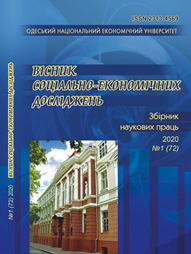Раціональність як філософська проблема та дієвий чинник формування економіки знань
DOI:
https://doi.org/10.33987/vsed.1(72).2020.9-24Ключові слова:
раціональність, ефективність, культура, економіка знань, синергетика, постмодерн, симуляція, постнекласична наукаАнотація
У статті досліджено місце і роль раціональності в функціонуванні сучасної економіки знань (цифрової економіки), забезпеченні її належної ефективності, підготовці економіки України до створення п’ятого і шостого технологічних укладів. Доведено, що раціональність – явище західної культури, має історичний характер, безпосередньо пов’язане з конкретним типом культури, є однією з її найвищих цінностей. Приділено особливу увагу аналізу зв’язку раціональності з наукою, дослідженню впливу конкретного типу науки на зміст раціональності й стиль раціонального мислення, осмисленню історично-системного підходу до осягнення характеру дії наукової раціональності на ефективність економічних систем. Результати досліджень продемонстрували надзвичайно складний характер зв’язків раціональності та ефективності в економічних системах макро- і глобального рівнів в умовах їхнього функціонування на засадах постнекласичної науки. Проілюстровано, що у таких об’єктах, які, зазвичай, є відкритими людиномірними системами з нелінійними зворотними зв’язками, досягти збігу за часом оптимального рівня функціонування і в раціональному плані, і в плані забезпечення їхньої належної ефективності, причому на довготривалу перспективу, досить проблематично. Доведено, що цей факт жодним чином не заперечує існування наукової раціональності як окремого типу раціональності, про що часто пишуть деякі філософи та вчені-представники постнекласичної науки. Дослідження показали, що, навпаки, у постнекласичну епоху наукова раціональність не втрачається, а зберігається, нерідко набуває ще більшої актуальності, ніж у часи панівного статусу класичної науки, хоча її зміст і стає більш «розпливчатим», завуальованим. Більше того, відкривається додаткова можливість розширення меж раціональності завдяки врахуванню впливу на неї ціннісних чинників, зокрема, моральних, естетичних, психологічних, теологічних тощо
Посилання
Intelligent economics – technological challenges of the XXI century (2011). [Intellektualnaya ekonomika – tekhnologicheskie vyzovy XXI veka], Ekonomika: Izbrannye trudy, T. VI, 2-e izd.; pod red. O. Sabdena, IE KN MON RK, Almaty, 320 s. [in Russian]
Kasavin, I. T., Lektorskiy, V. A., Shvyrev, V. S. (2005). Rationality as a cultural value [Ratsionalnost kak tsennost kultury], Vestnik Rossiyskoy akademii nauk, T. 75, No. 11, s. 1028–1037 [in Russian]
Stepin, V. S. (2000). Theoretical knowledge: structure, historical evolution: monograph [Teoreticheskoe znanie: struktura, istoricheskaya evolyutsiya: monografiya], ProgressTraditsiya, Moskva, 743 s. [in Russian]
Taler, R. (2018). New behavioral economics: why do people break the rules of the traditional economy and how to make money. Trans. from Eng. A. Prokhorova [Novaya povedencheskaya ekonomika: pochemu lyudi narushayut pravila traditsionnoy ekonomiki i kak na etom zarabotat; per. s angl. A. Prokhorovoy], Eksmo, Moskva, 384 s. [in Russian]
Dzioban, O. P. (2011). Synergetic ideas development as a new paradigm in natural science and social cognition [Rozvytok idei synerhetyky yak novoi paradyhmy u pryrodnychonaukovomu i sotsialnomu piznanni], Visnyk Natsionalnoi Yurydychnoi akademii Ukrainy im. Ya. Mudroho. Seriia: Filosofiia, filosofiia prava, politolohiia, sotsiolohiia, No. 9, s. 3–16 [in Ukrainian]
Order out of chaos: a new dialogue between man and nature (1986). Trans. from Eng. Ed. by V. I. Arshinov, Yu. L. Klimontovich, Yu. V. Sachkov [Poryadok iz khaosa: novyy dialog cheloveka s prirodoy; per. s angl., obsh. red. V. I. Arshinova, Yu. L. Klimontovicha, Yu. V. Sachkova], Progress, Moskva, 432 s. [in Russian]
Kushch, A. From the era began to microrobots. How can Ukraine not fall out of civilization [Iz epokhi stali k mikrorobotam. Kak Ukraine ne vypast iz tsivilizatsii], Delovaya Stolitsa ot 04.11.2019. Retrieved from: https://www.dsnews.ua/vlast_deneg/izepohi-stali-k-mikrorobotam-kak-ukraine-ne-vypast-iz-28102019220000 [in Ukrainian]
Shishkov, I. Z. (2018). History and philosophy of science. 2 nd ed. [Istoriya i filosofiya nauki; 2-e izd.], LENAND, Moskva, 664 s. [in Russian]
Sydorenko, O., Makukha, S., Kovalenko, О. (2019). The dialectic of rationality and economic efficiency: problems, attainments, possible solutions [Dialektyka ratsionalnosti ta ekonomichnoi efektyvnosti: problemy, zdobutky, mozhlyvi shliakhy vyrishennia; za red.: М. I. Zvieriakova (gol. red.) ta in.], Visnik social’no-ekonomicnih doslidzen’, No. 2-3 (70-71), s. 9–19 [in Ukrainian]
Propedeutical course in philosophy of science (2017). Ed. by O. P. Sydorenko [Propedevtychnyi kurs z filosofii nauky; za red. O. P. Sydorenka], Osvita Ukrainy, Kyiv, 430 s. [in Ukrainian]
Mozheyko, M. A. (2003). The latest philosophical dictionary. 3 rd ed. [Noveyshiy filosofskiy slovar; 3-e izd.], Knizhnyy Dom, Moskva, 1280 s. [in Russian]
##submission.downloads##
Опубліковано
Номер
Розділ
Ліцензія
Авторське право (c) 2020 Вісник соціально-економічних досліджень

Ця робота ліцензується відповідно до Creative Commons Attribution 4.0 International License.






